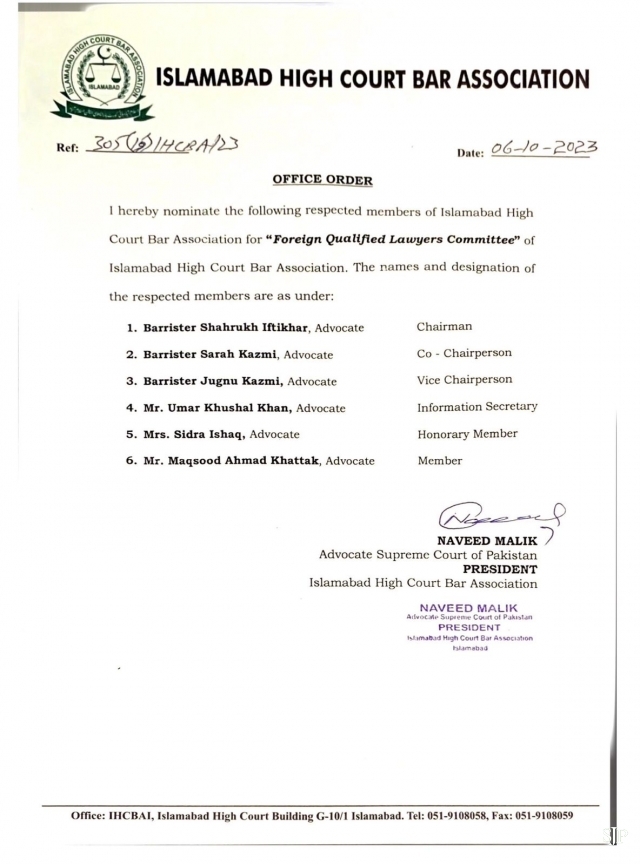Foreign Qualified Lawyers
Why the Name "Foreign Qualified
Lawyers Committee?
In numerous legal jurisdictions,
foreign-educated lawyers are
permitted to practice law, subject to
specific conditions and often creates a
separate guidance for them to allow
them to practice in that jurisdiction.Pakistan, including the
Islamabad Bar Council, upholds a
similar practice. The term "foreign
degree holders" is used by the
Islamabad Bar council referring to
individuals whose first law degree is
from outside Pakistan. These individuals are allowed to enroll, provided they meet certain criteria.
Why the Need for Representation for
Foreign Qualified Lawyers (FQL) at
the Islamabad Bar:
What distinguishes Pakistan from
other legal systems is the substantial
number of foreign law degree holders,
largely attributable to the popularity
of the University of London
International Programme.
Thisprogram produces approximately
600 graduates annually in Islamabad
alone. However, these FQLs
encounter obstacles during the
licensing process, primarily stemming
from varying degree verification procedures. Their lack of familiarity
with preparation for additional exam
of HEC SEE coupled with insufficient
guidance, often deters them from
pursuing the license or results in
abandonment of their efforts. Among
those FQLs who do acquire licenses
and are eligible for Islamabad High
Court Bar Association (IHCBA)
membership mostly don’t pursue it.
Conversely, those who do engage are
often inactive. The necessity for
increased inclusivity aligns with the
broader interests of both the IHCBA
and the legal fraternity. Armed with foreign law degrees, these lawyers are authorized to practice Pakistani law following enrollment. However, they lack the comprehensive understanding of
Pakistani law that domestic law
graduates possess. Thus, a program
for capacity building becomes
imperative.
Objectives of the Foreign Qualified
Lawyers Committee (FQLC)
The FQLC has three primary
objectives:
1. Facilitating enrollment at
Islamabad Bar Council: We aim to
provide support and guidance to streamline the licensure process for
foreign qualified lawyers.
2. Enhancing Capacity: Our
committee seeks to bridge the
knowledge gap between foreign and
domestic law graduates, ensuring parity in fundamental legal understanding.
3. Fostering Networking and
Knowledge Exchange: By organizing
events and activities, we aspire to create a platform where foreign
qualified lawyers can interact and
network with active bar members.
This exchange of knowledge and
experiences benefits all participants.
If you are a current or prospective member of the Islamabad bar, kindly fill out the following form. https://docs.google.com/forms/d/e/1 FAIpQLSeOylgjnxn- UElAvlQmJx1FQ3Rx8R0e8IQzHQ0 MCA6LY9jaUA/viewform
Lawyers Committee?
In numerous legal jurisdictions,
foreign-educated lawyers are
permitted to practice law, subject to
specific conditions and often creates a
separate guidance for them to allow
them to practice in that jurisdiction.Pakistan, including the
Islamabad Bar Council, upholds a
similar practice. The term "foreign
degree holders" is used by the
Islamabad Bar council referring to
individuals whose first law degree is
from outside Pakistan. These individuals are allowed to enroll, provided they meet certain criteria.
Why the Need for Representation for
Foreign Qualified Lawyers (FQL) at
the Islamabad Bar:
What distinguishes Pakistan from
other legal systems is the substantial
number of foreign law degree holders,
largely attributable to the popularity
of the University of London
International Programme.
Thisprogram produces approximately
600 graduates annually in Islamabad
alone. However, these FQLs
encounter obstacles during the
licensing process, primarily stemming
from varying degree verification procedures. Their lack of familiarity
with preparation for additional exam
of HEC SEE coupled with insufficient
guidance, often deters them from
pursuing the license or results in
abandonment of their efforts. Among
those FQLs who do acquire licenses
and are eligible for Islamabad High
Court Bar Association (IHCBA)
membership mostly don’t pursue it.
Conversely, those who do engage are
often inactive. The necessity for
increased inclusivity aligns with the
broader interests of both the IHCBA
and the legal fraternity. Armed with foreign law degrees, these lawyers are authorized to practice Pakistani law following enrollment. However, they lack the comprehensive understanding of
Pakistani law that domestic law
graduates possess. Thus, a program
for capacity building becomes
imperative.
Objectives of the Foreign Qualified
Lawyers Committee (FQLC)
The FQLC has three primary
objectives:
1. Facilitating enrollment at
Islamabad Bar Council: We aim to
provide support and guidance to streamline the licensure process for
foreign qualified lawyers.
2. Enhancing Capacity: Our
committee seeks to bridge the
knowledge gap between foreign and
domestic law graduates, ensuring parity in fundamental legal understanding.
3. Fostering Networking and
Knowledge Exchange: By organizing
events and activities, we aspire to create a platform where foreign
qualified lawyers can interact and
network with active bar members.
This exchange of knowledge and
experiences benefits all participants.
If you are a current or prospective member of the Islamabad bar, kindly fill out the following form. https://docs.google.com/forms/d/e/1 FAIpQLSeOylgjnxn- UElAvlQmJx1FQ3Rx8R0e8IQzHQ0 MCA6LY9jaUA/viewform

